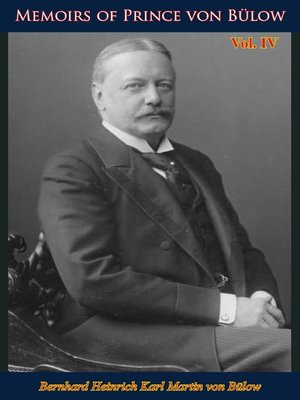Memoirs of Prince von Bülow Volume 4
ebook ∣ Early Years and Diplomatic Service 1849 – 1897 · Memoirs of Prince von Bülow
By fürst Bernhard Heinrich Martin Karl von Bülow

Sign up to save your library
With an OverDrive account, you can save your favorite libraries for at-a-glance information about availability. Find out more about OverDrive accounts.
Find this title in Libby, the library reading app by OverDrive.



Search for a digital library with this title
Title found at these libraries:
| Library Name | Distance |
|---|---|
| Loading... |
Early Years and Diplomatic Service 1849 – 1897 "When the last trumpet sounds, I shall present myself before the Sovereign Judge with this book in my hand, and say aloud: Thus have I acted; these were my thoughts; such was I." So Jean-Jacques Rousseau in his celebrated "Confessions." In their intense subjectivity and frankness the memoirs of Prince von Bulow resemble those of the illustrious Frenchman. Brilliantly composed in an informal conversational style, well spiced with gossip, and containing many striking characterizations of notable contemporaries, the reminiscences of the fourth Chancellor of the German Empire will certainly rank high among the lighter political memoirs of the present century. An eventful life, important contacts, and a long political career supplied Bülow with ideal material for the writing of a stimulating autobiography. Prince Bulow bore a name distinguished in the history of German diplomacy, politics, and military affairs. Trained in the Bismarckian school, and a protege of the Iron Chancellor, Bulow served in every important diplomatic post in Europe with the exception of London and Constantinople. With Bismarck's resignation in 1890, he might have become a brilliant young diplomat with a great future behind him, had he not caught on with the new regime under William II. In 1897 he was appointed Secretary for Foreign Affairs, and three years later he became Imperial Chancellor. His resignation in 1909 was occasioned by the famous Daily Telegraph incident which cost him the Kaiser's confidence and embittered his entire later life. He reappeared on the political stage for a brief moment during the War as Ambassador to Italy, but his mission ended in failure when Italy joined the Allied Powers in 1915. Six years later, at the age of seventy-two, he began the composition of his memoirs, a task that occupied him until his death in 1929.-VQR







